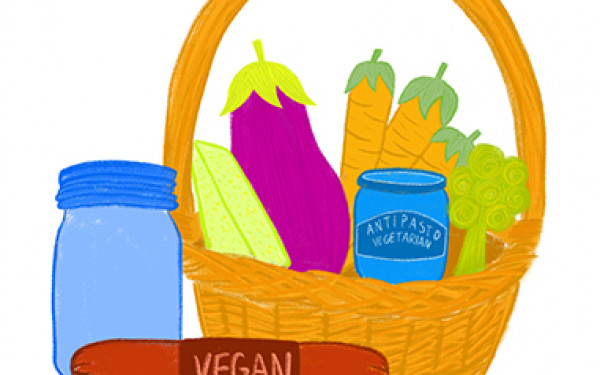A Mealtime Epic
Chartwells, Sysco and the Future of Food at Concordia
A request for proposal (RFP) for a new campus-wide food service provider is under negotiation between many groups, including students; it will be ready by the end of the year, according to Concordia University spokesperson Chris Mota. It’s been almost 12 years since Chartwells signed an exclusive contract with Concordia University.
According to Chartwells’ website, the multinational food service employs a “diverse family [of] expert chefs and registered dietitians” and “takes pride in meeting expectations by ensuring that all student and client needs are met and understood.”
Anisa Ben-Saud, a first-year biology student living in Loyola’s Hingston Hall residence, said that multiple members of the Buzz Bistro cafeteria, including the kitchen manager, asked her what gluten was on separate occasions. Ben-Saud has Celiac disease and is also lactose-intolerant.
“It affects both my physical and mental [health],” Ben-Saud told The Link. “If I eat [gluten] in large amounts, then I’ll have a stomachache, or I just can’t eat at all [after].
“It affects my concentration, my mood—everything gets harder.”
The Buzz Bistro and Grey Nuns Dining Hall both claim to offer gluten-free options as well as vegan and vegetarian choices. Ben-Saud recounted a mere few instances where they catered to her intolerance. Once they made gluten-free pizza for her and also served gluten-free brownies.
Ben-Saud paid a flat rate of $1,975 for the “Freedom Plan”, one of a handful of meal plan options all residents are obligated to choose from. However, her options are more limited.
Unlike most of her neighbors, Ben-Saud includes $150 worth of monthly supplements in her diet, like magnesium, tyro-trypt and amino acids, plus $50 worth of weekly gluten-free groceries. The Jesuit residence of Loyola possesses a kitchen for students, but Ben-Saud said management has yet to let her use it.
An Industry Congealed
Newton Jr. Jegu, the general manager of Concordia Food Services and a representative of Chartwells, is aware of Ben-Saud’s predicament and is working toward a resolution. He said that she should be in direct, consistent contact with the kitchen’s chef to address her specific needs. He added that she is part of a group that is less than one per cent of the population he feeds.
“There are no students we want [to see] starve. We want them to eat,” Jegu said. “But on the other hand, they need to realize we have some parameters to work in. Our hands are tied.”
Sysco is the food supplier for Concordia University. Any company that is ordering food orders from Sysco, according to Jegu. Sysco is the main culprit for situations like Ben-Saud’s and that Concordia is at the “mercy” of suppliers who don’t have the required amounts of specific dietary products, he added.
“It’s not affordable for them, so they don’t want to carry those products anymore,” Jegu said of Sysco’s business model. “So if they don’t carry them, we have to find a way to accommodate students. This is the type of gymnastics we have to do.”
Leonardo Barardinelli, the executive chef of Concordia’s Grey Nuns Dining Hall, echoed Jegu’s sentiments. He said that Chartwells wants to supply “good products,” but they have a budget to maintain when dealing with the food supplier.
“Sysco has some problems, [like how] they don’t keep everything on stock,” Barardinelli said about trying to order new products. “Sometimes we have to wait three weeks before we get it.”
Jegu recounted a recent exchange of approximately 15 emails between him, Barardinelli and a sales representative from Sysco to obtain one single item. In addition, trips to the grocery store are frequent for both Jegu and Barardinelli as they both work around company policy to buy unavailable products. They have “no choice” but to take risks, Jegu said.
“It’s not Chartwells; it’s the industry,” Jegu said. “The industry right now, I would say, is five years late with the process of [handling new diet trends].”
In response to learning that some of his staff do not know what gluten is, Jegu said that more training and coaching are necessary to educate employees who aren’t food “savvy” enough.
“The biggest challenge we have right now is that we’re open all day from seven [a.m.] to nine [p.m.],” Jegu continued. “When do I have time to train people? We had some training, yes, but we need to get more in-depth.”
The Alternatives
The Concordia Food Coalition is coordinating one of the potential bidders in the RFP process. Lauren Aghabozorgi, the office coordinator of the coalition, said that their plan is to get a “consortium” of different, local food businesses to form a single bid together.
“The objective is to have not one huge corporation controlling all of the food outlets on campus [but] to actually have more of a diversity of different businesses that work to our values and our ethics around healthy and sustainable food,” Aghabozorgi said.
The process will be done in the next month or so and no more than eight businesses will be involved, she added. However, Aghabozorgi remains “skeptical” about the university administration’s future decision, adding that these processes often come down to choosing the bidder with more money and a stable business, which is usually a corporation.
The Concordia Student Union is also actively involved in the negotiations for the RFP. CSU president Benjamin Prunty, a member of The Hive Café Co-op board, said he supports the Concordia Food Coalition’s bid.
Prunty called The Hive Café Co-op, located at both campuses, the “potential cornerstone of the future food systems.” Acknowledging it’s an ambitious goal, Prunty added that the CSU wants to ensure the next contract is shorter than Chartwells’s 12-year agreement so they can make a future bid for The Hive Cafés to be the main cafeterias.
According to a press release from Concordia University, its Services Department conducted a survey of the “entire campus community” and identified many “important factors” for the next contract. The report stated that students are important stakeholders in the “overall food system procurement landscape.”
Prunty said he disagreed with the diction chosen by the university, stating that students should be “key stakeholders” in “developing a food system” rather than choosing a food procurement process.
“We have a vibrant food and sustainability culture on the student level,” he said. “When we negotiate with the university, we say there’s room for growth in that area.”
The CSU president continued by acknowledging that help from the university is necessary to implement any major changes because students don’t have the resources for “large construction projects.” He added that Concordia University VP Services Roger Côté was helpful in facilitating projects like The Hive Café and Reggie’s.
In its first three months of operation, The Hive Café gained approximately 2,300 new members, according to CSU VP Sustainability Jessica Cabana, who also serves on The Hive’s board.
Cody Jacobs, a barista at The Hive Café in the Hall building, said the new student lounge and eatery has been doing “great” since it began full operations in September. Initiatives to garner more student support include a new honour system for buying coffee, where students can bypass long lines to self-serve their own mugs and drop money into a jar under no guise or watch.
“I think we all think of The Hive as a place where people not only have a space where they can study and feel welcomed to, but also to provide kids with sustainable food options, which is not always available on campus,” Jacobs said.
Correction: In a previous version, it stated that the CFC was part of the potential bid for the RFP contract. The student organization is only coordinating the consortium and is not officially part of it. The Link regrets the error.





copy_600_375_90_s_c1.jpg)

